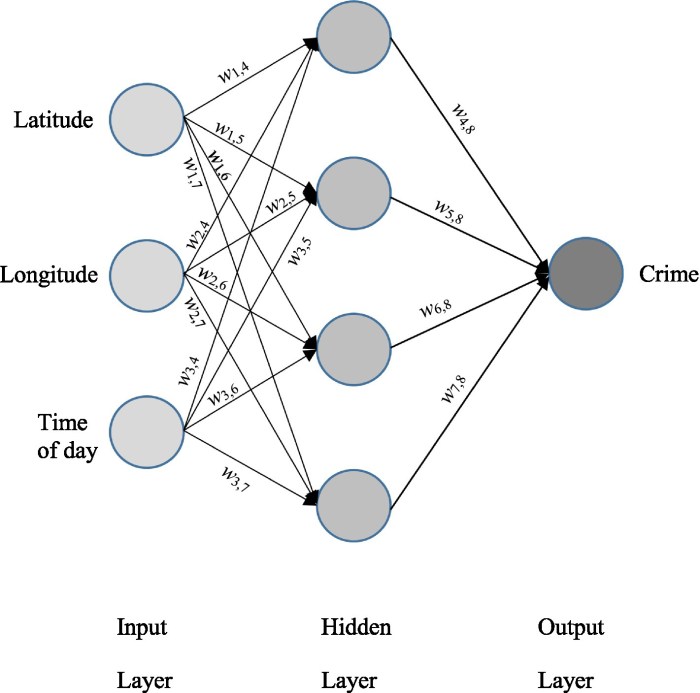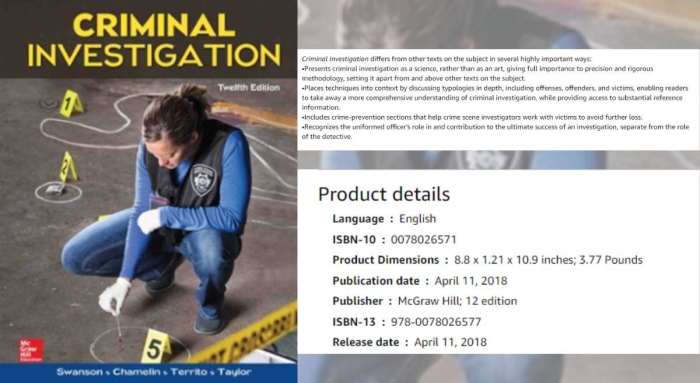Welcome to the definitive resource for criminal investigation: Criminal Investigation 12th Edition PDF Free. This comprehensive guide delves into the intricacies of modern investigative techniques, empowering you with the knowledge and skills to navigate the complex world of crime solving.
From the fundamental principles to the latest advancements in forensic science, this book provides a thorough understanding of the investigative process. Prepare to unravel the mysteries of crime scenes, master the art of interviewing and interrogation, and delve into the meticulous world of evidence collection and analysis.
1. Criminal Investigation
A Comprehensive Overview

Criminal investigation encompasses a comprehensive process of uncovering and analyzing evidence to determine the truth about criminal offenses. It involves understanding fundamental principles, employing forensic science and technology, and adhering to ethical and legal considerations.
Forensic science plays a crucial role in modern investigations, providing scientific methods to analyze evidence, such as DNA profiling, ballistics, and trace analysis. Technology, including surveillance cameras, GPS tracking, and digital forensics, has enhanced the efficiency and accuracy of investigations.
Ethical and legal considerations are paramount in criminal investigations. Investigators must respect the rights of individuals, obtain evidence legally, and maintain the integrity of the investigation process.
1.1. Principles and Concepts of Criminal Investigation
- Objectivity and impartiality
- Thoroughness and attention to detail
- Timeliness and efficiency
- Cooperation and collaboration
- Professionalism and ethics
2. Crime Scene Investigation

Crime scene investigation is a critical aspect of criminal investigations, as it provides the foundation for gathering and preserving evidence. It involves securing the scene, documenting the surroundings, and collecting physical evidence.
2.1. Crime Scene Investigation Procedures
- Securing and preserving the scene
- Documenting the scene through photography, sketching, and notes
- Identifying and collecting physical evidence
- Searching for and interviewing witnesses
2.2. Crime Scene Reconstruction and Analysis
Crime scene reconstruction involves recreating the events leading to the crime based on evidence. It helps investigators understand the sequence of events, identify suspects, and determine the cause of death.
3. Interviewing and Interrogation

Interviewing and interrogation are essential techniques for gathering information from witnesses and suspects. They require effective communication skills, empathy, and an understanding of human behavior.
3.1. Types of Interviews
- Informational interviews
- Investigative interviews
- Suspect interviews
3.2. Principles and Techniques of Effective Interviewing
- Establishing rapport
- Active listening
- Non-leading and open-ended questions
- Documenting the interview accurately
4. Evidence Collection and Analysis
Evidence collection and analysis are crucial for establishing the facts of a crime. It involves identifying, collecting, preserving, and analyzing physical, digital, and biological evidence.
4.1. Types of Evidence
- Physical evidence (e.g., fingerprints, weapons, clothing)
- Digital evidence (e.g., computer files, social media data)
- Biological evidence (e.g., DNA, blood, hair)
4.2. Methods of Evidence Collection and Analysis
- Photography and videography
- DNA profiling
- Fingerprint analysis
- Ballistics testing
4.3. Role of Forensic Laboratories
Forensic laboratories play a vital role in evidence analysis, providing scientific expertise and specialized equipment to examine and interpret evidence.
5. Case Management and Investigation Planning
Effective case management ensures a systematic and organized approach to criminal investigations. It involves planning, coordination, and monitoring the investigation process.
5.1. Importance of Case Management
- Improves efficiency and effectiveness
- Facilitates communication and collaboration
- Ensures proper resource allocation
- Provides a framework for decision-making
5.2. Steps in Investigation Planning, Criminal investigation 12th edition pdf free
- Defining the scope and objectives of the investigation
- Gathering and analyzing information
- Developing and implementing an investigation plan
- Evaluating and modifying the plan as needed
User Queries: Criminal Investigation 12th Edition Pdf Free
What are the key principles of criminal investigation?
The fundamental principles of criminal investigation include objectivity, thoroughness, impartiality, and adherence to legal and ethical guidelines.
How does forensic science contribute to criminal investigations?
Forensic science plays a crucial role by providing scientific analysis of evidence, such as DNA analysis, fingerprint identification, and ballistics testing, to support investigative findings.
What are the ethical considerations in criminal investigations?
Ethical considerations in criminal investigations center around respecting the rights of individuals, maintaining confidentiality, and ensuring the integrity of evidence and investigative procedures.